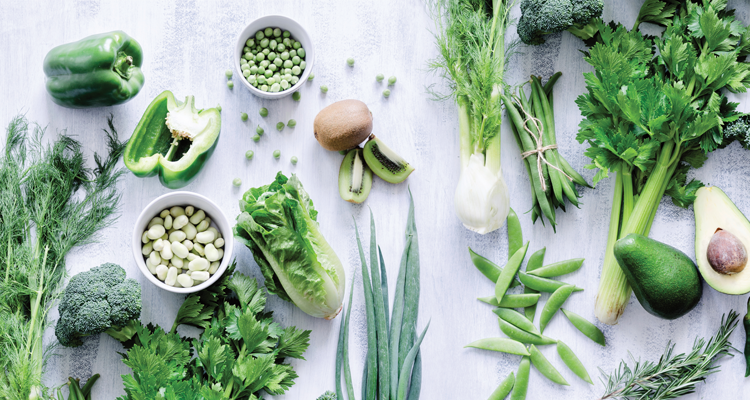A plant-based diet could help prevent disease and increase your longevity.
Dr. Sal, Vice President of Health & Wellness at Lee Memorial Health System, explains.
Growing up in an Italian home was wonderful. My mother expressed her love to my family in many ways, including through her deliciously traditional Italian meals. Sunday was macaroni and “gravy” day—yes, gravy, not pasta sauce, as many people refer to it. That beautiful tomato and meat sauce slow-boiling on the stove for hours before the meal would fill the house with a mouth-watering aroma. As I passed by the stove, I remember peering into the pot to see succulent meatballs, sausages, and spare ribs cooking until the meat fell off the bone. I couldn’t help myself; I’d sneak a piece of Italian bread and dip it into that gravy for a “preview” of dinnertime—absolute heaven!
As the years passed, meals traditionally consisted of meat with some other side items, but rarely many vegetables. Unfortunately, our household was very much typical; the standard Italian and American diets today largely consist of meats, starch, and a whole lot of sugar (thanks to processed foods).
I only started to question that diet about five years ago, when I began to focus my medical practice on preventive health care. For the prior 18 years, I had practiced general internal medicine, though I counseled most of my patients on the importance of eating healthy and exercising regularly. I wanted them to prevent disease so I didn’t have to treat their chronic illnesses or cancers down the road.
Once I began my quest to discover how food affected health in 2010, I hit the books. After poring over hundreds of writings and research articles in the ensuing years, I have a much deeper understanding of the relationship between food and health and food and disease. In particular, I studied the lives of people in “Blue Zones“—places around the world like Sardinia, Italy; Ikaria, Greece; and Loma Linda, California, just to name a few—where people live the longest (into their 90s and 100s!). Though there are many factors that contribute to their long lives, such as being active daily, having strong social ties and family support, and security, one of the common denominators was the food they ate.
Indeed, their diets often included only the healthiest kind of foods—nothing processed, plenty of vegetables, some fruits, nuts and grains, and limited amounts of grass-fed meat. Now this was the recipe for good health and longevity! (Looking for healthy changes, Is The Pegan Diet Right For You?)
From that discovery, I decided that I, too, would adopt this lifestyle, so over the past five years, I have followed a “plant-based” nutrition program. That even meant changing my work schedule to allow two days per week to run (three to four miles at a time) and two days to do a one-hour body pump weight lifting class.
My diet has shifted significantly as well; over the last two years, I have eaten no meat (that includes red meat, pork, and chicken), and have greatly restricted my dairy intake. However, you do have to live a little, so once a week, my family enjoys movie-and-pizza night, and the cheese on the pizza is my only dairy indulgence.
So what does a typical day’s meal plan look like for me? Well, for breakfast, I might have oatmeal with fresh fruits, or whole grain toast with organic almond butter. Other mornings, it might be a bowl of lentils, beans, and quinoa. Lunch is normally a large spinach salad loaded with broccoli, peppers, tomato, avocado, beets, and any other veggies I can add. For dinner, I typically have wild fish twice per week, and on the rest of the days, the main course is vegetables with a non-meat protein (there are many delicious soy products out there that add non-GMO protein to any meal). The great thing about these meals is that they make me feel full, satiated, and energetic; the lack of traditional meat protein does not limit my energy.
Aside from these three square meals, I also snack on fruits, nuts, and seeds, and “treat” myself to a piece of dark chocolate after dinner. Drinks include lots of water, some green tea, and a four-ounce glass of red wine with dinner.
Many friends and family members have asked if this lifestyle and nutrition program was difficult to follow, and honestly? The answer is “no.” That’s primarily because of the overwhelming evidence showing that the standard American diet is the main culprit for most of the chronic illnesses and many common cancers people suffer from, so practicing prevention in my own diet and lifestyle in order to have a longer, fulfilling life is of utmost importance to me. I also want to remain active as an athlete and continue to be maximally functional both physically and mentally. (Check out this Plant-Fueled Fitness)
Every day, I awaken at 5 a.m. and maintain a full work, home, and exercise schedule that has not been hampered by the lack of meat protein in my diet. In fact, I have read about many professional NBA, NFL, and even Olympic athletes and a few mixed martial arts fighters who eat only plant-based foods; obviously their diets are part of what helps keep them strong and delivering performance after world-class performance.
In addition, the education I have gleaned from reading about the chemical basis of nutrition helps me better understand why we must focus on food as medicine. That’s because food is medicine, and the thousands of chemicals naturally found in vegetables, fruits, nuts, seeds, and whole grains are what keep us healthy and hale. In contrast, foods consumed as part of the standard American diet (high in fat, sugar, and salt), as research shows, actually causes most of the heart disease, diabetes, obesity, strokes and cancers that many of our family members and friends have to deal with as they age. (We are also Overfed and Undernourished)
Lastly, if you have not watched the video “Make Health Last” (available on YouTube), I highly recommend that you do. This short video poignantly depicts one man maturing gracefully with good health and vitality, and in stark contrast, the same person aging the way most people do in America: poorly. Most Americans spend the last years of their lives dealing with chronic illnesses that rob them of their “golden years.” I watched this happen to my father and so many of my patients and friends, and would love for this to never happen to anyone again.
But, as the commentator in the video states: [Tweet “the choice is yours. You can grow old with vitality, or get old with disease,”] and for me, a plant-based nutrition program with a fun exercise regimen, good sleep, stress management, and a loving family and set of friends is definitely my preference!

